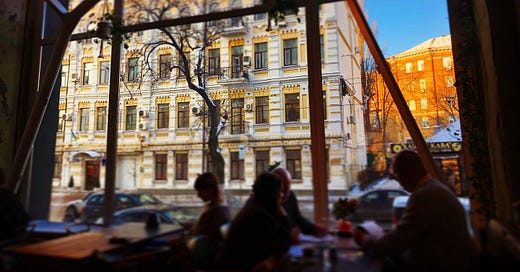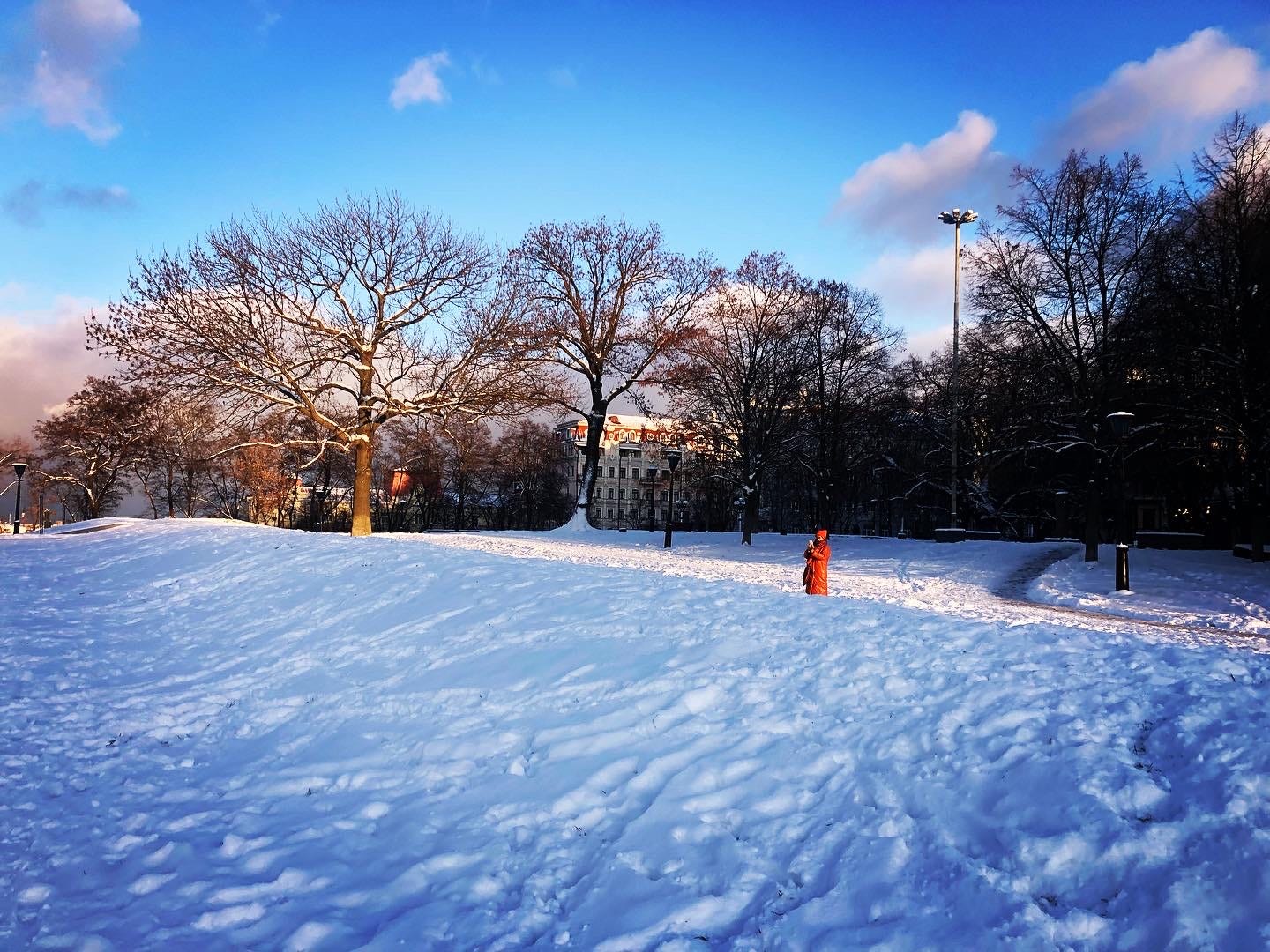The night before I was evacuated there were light snow flurries and the sun set at 4:52 pm. I was with my husband, our friend Oleks, and two American journalists at a small underground speakeasy in the heart of Kyiv.
The week before I was evacuated from Ukraine in early February, my husband and I sat at our friends’ dinner table at their spacious flat in Kyiv. Lina and Oleks’s home has colorful walls, blue and white Portuguese tiles in the kitchen, thick green house plants—vines, flowers and monstera—patterned fabrics, paintings, and framed pictures of family adventures around the world. The table was crammed with dips and fresh bread, grilled meats and sauteed vegetables, vodka, whiskey and red wine.
We had been laughing at a dirty joke and taking shots, making toasts: Slava Ukraini and Heroyam Slava.
But now it was quiet, save for the jazz playing on the stereo and the hum of traffic eight stories below. I held Lina’s hand as she told me she was scared for her children. They’d applied for a visa in North America and had been rejected. She didn’t know how she’d get her kids out of the country if the unthinkable happened. I tried to reassure her that there would be a way. There was always a way. I had no right to offer those words.
The night before I was evacuated there were light snow flurries and the sun set at 4:52 pm. I was with my husband, our friend Oleks, and two American journalists at a small underground speakeasy in the heart of Kyiv. It has no menu and no sign, tucked under a restaurant and behind a movable bookshelf. Inside there’s an upright piano with a candelabra on it, and a bar. It could double as a bomb shelter. The wallpaper is greyish green, with gold ferns and white cockatoos that unfurl into every shadowy corner. If you stare at it long enough, the birds seem to beckon in the candlelight. That night we drank old fashioneds and gimlets, and talked politics, music, poetry and history. Said things like “there’s no way” and “would be idiotic” and “can you imagine?”
On February 24th I was in Omaha, Nebraska, 8,563 kilometers away from our apartment in Kyiv. The sun set at 6:08 pm. I was safe. I was warm. I split in two.
I am not Ukrainian. We lived there for nine months.
And yet, it doesn’t take long for Ukraine to bind itself to you in a way that pulses and glows. It’s as much a spirit as it is black soil.
It’s a vivid abstract mural in blues, blacks and yellows, three stories high on the side of a repurposed soviet-era structure; the new parents who bundle their child in a puffy pink snowsuit to go sledding in the park when it’s five below and the adults bring a thermos of brandy to share; the easy late-autumn magic of dusk on Bald Mountain; the earthenware bowl of hot red borscht; a lively debate between students over coffee and tacos next to the velodrome; picnics and singing with friends in the park across from Taras Shevchenko University; the men and women—pensioners, mostly—in yellow vests, picking up litter and salting the icy streets.
It’s the thousands of people who braved bitter cold and sniper fire at Independence Square to demand a freer society; it’s a DakhaBrakha concert where everyone dances in the aisles; the careful embroidery on a vyshyvanka, that indicates where it was handmade; the open invitation to bring your pet literally everywhere.
It’s turning the cleanup of bombed out rubble into a community dance party; it’s a woman with a handful of sunflower seeds.
Lina and her children are in the U.S. for now. They can stand on the porch of their host family’s house, look over the sprawling green lawn at the distant mountains and not fear the sound of air raid sirens going off in the night.
Their daughter wears her vyshyvanka sometimes, it’s white with red flowers.
Oleks is still in Ukraine. He’s driven cancer patients through the war zone to borders where they can get help. He’s picked up bodies from the streets. He delivers food, aid, and cheeky smiles where needed. When he’s back at their flat in Kyiv, he is by himself. Alone, he says, with the ghosts of his tribe.
Whether a hundred days or a hundred years from now, Ukraine will still be Ukraine. And hopefully we’ll have done a better job of listening to all it has to say.
Perhaps, if we’re lucky, our ghosts will gather again around the table to laugh at dirty jokes and to be made whole in the light.
Born in Seattle and raised in Southeast Asia, Kate Ryan Brewer is a writer and director. Her first feature film, Knots: A Forced Marriage Story, is an award-winning documentary about forced and child marriage in the U.S. It's also the subject of her TEDx Talk.
Kate is also a published author, short story writer, and essayist, and she has collaborated on several art and media projects. Her most recent performance was at a WordTheatre event in London. She graduated from Florida State University film school, and she has lived and worked around the world. Kate’s next two features are horror films.
Brewer’s flash fiction, The Ladies of the Lake, previously appeared on Fiction Attic.









Powerful.